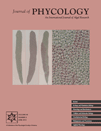
JOURNAL OF PHYCOLOGY
Scope & Guideline
Elevating Knowledge in Plant and Aquatic Sciences
Introduction
Aims and Scopes
- Diversity and Taxonomy of Algae:
Emphasizes the classification, identification, and phylogenetic relationships of algal species across various taxa, including new species descriptions and taxonomic revisions. - Ecological and Physiological Studies:
Focuses on the ecological roles of algae in different environments, their physiological responses to environmental changes, and their interactions with other organisms. - Molecular Biology and Genetics:
Explores the genetic diversity and molecular mechanisms in algae, including genome analysis, genetic transformation, and molecular phylogenetics. - Applied Phycology:
Investigates the practical applications of algae in biotechnology, biofuels, and environmental management, particularly in relation to sustainability and ecosystem services. - Algal Biogeography and Distribution:
Studies the geographical distribution and biogeographical patterns of algae, assessing how they are influenced by climatic and environmental factors.
Trending and Emerging
- Cryptic Diversity and Molecular Phylogenetics:
There is a growing emphasis on uncovering hidden diversity within algal taxa through molecular techniques, leading to the discovery of new species and insights into evolutionary relationships. - Climate Change and Algal Responses:
Research focusing on how climate change affects algal physiology, distribution, and ecology is increasingly prevalent, highlighting the importance of understanding algal resilience in changing environments. - Biotechnological Applications of Algae:
Studies exploring the use of algae in biotechnology, including biofuels, pharmaceuticals, and bioremediation, are on the rise, reflecting an increased interest in sustainable applications of algal resources. - Microalgae in Aquaculture and Food Security:
Research on the role of microalgae in improving aquaculture practices and their potential as food sources for human consumption is gaining traction, emphasizing the nutritional and economic benefits of algal products. - Interactions Between Algae and Microbial Communities:
An emerging focus on the relationships between algae and associated microbial communities is evident, shedding light on the ecological dynamics that influence algal health and productivity.
Declining or Waning
- Traditional Morphological Studies:
Research focused solely on morphological characteristics of algae without integrating molecular techniques has become less common, as the field leans towards more comprehensive approaches that incorporate genetic data. - Invasive Species Research:
Although still relevant, the frequency of studies solely dedicated to invasive algal species has decreased, possibly due to a transition towards understanding broader ecological impacts and management strategies. - Environmental Toxicology of Algae:
While studies on the effects of pollutants on algae remain important, there appears to be a waning focus on this area, as researchers increasingly address broader ecological and physiological implications.
Similar Journals
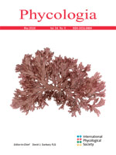
PHYCOLOGIA
Advancing Knowledge in Aquatic and Plant EcosystemsPHYCOLOGIA is a prestigious academic journal published by Taylor & Francis Ltd, specializing in the fields of Aquatic Science and Plant Science. With an ISSN of 0031-8884 and an E-ISSN of 2330-2968, the journal has established itself as an influential platform for disseminating high-quality research on algal biology and its ecological significance. Renowned for its rigorous peer-review process, PHYCOLOGIA is categorized in the Q2 quartile for both Aquatic Science and Plant Science as of 2023, reflecting its solid reputation and contribution to the respective fields, evidenced by Scopus ranks placing it in the top tiers of research outputs. The journal offers access to a wealth of knowledge, embracing studies that range from fundamental aspects of phycology to applied environmental sciences, making it a vital resource for researchers, professionals, and students who seek to advance their understanding of aquatic and plant ecosystems. With a focus on innovative methodologies and interdisciplinary approaches, PHYCOLOGIA invites submissions that push the boundaries of current knowledge and contribute to the global discourse on phytobiological sciences.

PAKISTAN JOURNAL OF ZOOLOGY
Connecting researchers to foster global zoological discourse.Pakistan Journal of Zoology, established in 1975 and published by the Zoological Society of Pakistan, is a pivotal resource in the field of zoology and animal science, contributing to the academic discourse and research advancements in the region. With an ISSN of 0030-9923, this journal strives to disseminate innovative research findings and scholarly articles that explore various facets of animal biology, ecology, and conservation. Although classified in the Q4 quartile within the animal science category, its commitment to providing a platform for emerging researchers makes it crucial for those in the zoological community. The journal covers a broad range of topics relevant to contemporary issues in zoology, promoting both local and international collaborations. Situated in Lahore, Pakistan, its contributions are vital for promoting biodiversity awareness and conservation efforts within the region. Accessible research outputs empower students and professionals alike to engage in critical discussions and applications within the disciplines of zoology and animal science.

ALGAE
Innovating research for a healthier planet.ALGAE, an esteemed publication by the Korean Society of Phycology, serves as an authoritative platform for researchers and practitioners in aquatic science, ecology, and plant science. Founded in South Korea, this journal has established a commendable reputation, reflected in its Q1 rankings across multiple categories in the 2023 Journal Citation Reports and its impressive Scopus rankings, which position it in the top 20% of its fields. With a scope that encompasses the latest advancements in algal studies, highlighting both fundamental and applied research, ALGAE is crucial for those looking to deepen their understanding of phycology and its implications for biodiversity and ecosystem health. Though not an open-access journal, it provides valuable insights and cutting-edge findings that are vital for the scientific community engaged in ecological and biological research. With its robust trajectory from 2013 to 2024, ALGAE continues to push the boundaries of knowledge and foster innovation within the discipline.

PLANT SPECIES BIOLOGY
Elevating Knowledge in Plant Species and Their EnvironmentsPLANT SPECIES BIOLOGY, published by WILEY in the United Kingdom, is a prominent journal dedicated to advancing the understanding of plant species, their biology, ecology, and roles within ecosystems. With an impressive convergence of research dating back to 1986 and extending through 2024, this journal caters specifically to specialists in the fields of plant science and ecology. The journal's current impact factor further underscores its significance, ranking in the Q2 quartile across three relevant categories: Ecology, Ecology, Evolution, Behavior and Systematics, and Plant Science. As a member of the Scopus ranks, it holds respectable positions within its categories, evidencing its contribution to impactful scientific discussions and knowledge. Although it is not an open-access journal, PLANT SPECIES BIOLOGY provides essential insights, fostering interdisciplinary dialogue and discovery for researchers, professionals, and students dedicated to exploring the complexities of plant species and their ecosystems.
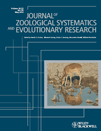
JOURNAL OF ZOOLOGICAL SYSTEMATICS AND EVOLUTIONARY RESEARCH
Unraveling Biodiversity Through Systematic ResearchThe Journal of Zoological Systematics and Evolutionary Research, published by Wiley-Hindawi, stands as a premier academic journal since its establishment, showcasing cutting-edge research in the fields of Animal Science, Zoology, and Ecology. With an impressive track record spanning from 1963 to the present, this journal has earned a Q1 classification in both Animal Science and Ecology, as well as recognized rankings in Genetics and Molecular Biology. Its impact is highlighted by its Scopus ranks, placing it in the top percentile for relevant categories, underscoring its vital role in advancing knowledge and understanding within these disciplines. Researchers, professionals, and students will find a wealth of high-quality, peer-reviewed articles that contribute to the evolutionary understanding of biodiversity and systematics. Though not an Open Access journal, it remains accessible to a wide audience committed to exploring the intricacies of zoology and evolutionary biology.
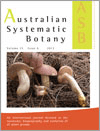
AUSTRALIAN SYSTEMATIC BOTANY
Connecting Research with Australia’s Unique FloraAustralian Systematic Botany is a prestigious academic journal dedicated to the field of plant science, published by CSIRO PUBLISHING. Established in 1988, this journal has become a vital resource for researchers, professionals, and students focusing on the systematic study of Australian flora. With an impressive track record and convergence extending to 2024, it operates in the Q3 category for Ecology, Evolution, Behavior and Systematics and Q2 for Plant Science as of 2023. The journal holds significant value in the academic community, given its Scopus ranking, which places it in the 61st and 59th percentiles within its respective categories. Although it follows a subscription-based model, the journal remains committed to advancing knowledge in systematic botany, offering critical insights that shape the future of ecological and biological research both in Australia and globally.
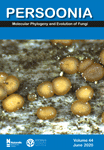
PERSOONIA
Championing Excellence in Plant Science ResearchPERSOONIA, a distinguished journal published by RIJKSHERBARIUM, serves as a pivotal platform for the dissemination of high-quality research in the fields of Ecology, Evolution, Behavior, and Systematics, as well as Plant Science. Established with a commitment to advancing scientific knowledge, PERSOONIA has achieved an impressive Q1 ranking in these areas, highlighting its significant impact within the academic community, as evidenced by its ranking of #12 out of 721 journals in its field, placing it in the top 2% of publications. With a publication history that spans from 1996 to present, the journal regularly features innovative studies that push the boundaries of understanding in ecological and botanical sciences. While Open Access options are currently limited, researchers and professionals alike benefit from subscription access to this vital resource. Located in the Netherlands, PERSOONIA continues to be a beacon for scholars aiming to enrich the discourse in evolving ecological and plant science disciplines.

Fottea
Pioneering studies that shape the future of phycology.Fottea is a prestigious journal, published by the Czech Phycological Society, dedicated to advancing the field of plant sciences with a specific focus on freshwater algal research. Established in 2008, this quarterly publication has steadily gained recognition, evidenced by its impressive Q2 ranking in Plant Science and a solid placement within the 68th percentile among its peers in Scopus rankings. Fottea serves as a vital platform for researchers, professionals, and students to disseminate and access cutting-edge studies, fostering collaboration and innovation within the aquatic ecosystem research community. Although currently operating under a traditional publishing model without open access options, it remains committed to providing high-quality, peer-reviewed content that is essential for the progression of phycology and related disciplines. With its base in the beautiful Czech Republic, the journal aims to bridge local and global research efforts, contributing to the broader understanding of algal biology and ecology.
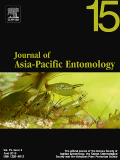
JOURNAL OF ASIA-PACIFIC ENTOMOLOGY
Unveiling the Secrets of Insects for a Sustainable TomorrowJOURNAL OF ASIA-PACIFIC ENTOMOLOGY, published by the Korean Society of Applied Entomology, is a distinguished platform that fosters the advancement of knowledge in the field of entomology, specifically tailored to the Asia-Pacific region. Since its inception in 1998, this journal has been instrumental in providing critical insights into the diverse aspects of insect science, reflecting its commitment to supporting both research and application in a variety of contexts, including agriculture and environmental sustainability. The journal is categorized in the Q3 quartile for Insect Science according to the 2023 rankings, and it holds a respectable Scopus rank of #62 out of 181 in its niche, situating it within the top 66th percentile of its field. With a focus on peer-reviewed research that emphasizes innovation and practical applications, the journal serves as an essential resource for researchers, professionals, and students seeking to deepen their understanding of entomological studies and their implications across ecological and agricultural landscapes.
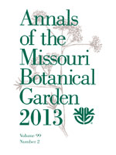
ANNALS OF THE MISSOURI BOTANICAL GARDEN
Unveiling Insights into Ecology, Evolution, and BehaviorANNALS OF THE MISSOURI BOTANICAL GARDEN is a prestigious, peer-reviewed journal published by the Missouri Botanical Garden, focusing on the rich disciplines of Ecology, Evolution, Behavior, and Plant Science. With a storied history dating back to 1946, this journal has evolved to become a significant platform for scholars and professionals to disseminate research that informs global understanding of plant biology and conservation. Ranked in the Q2 category for both Ecology and Plant Science in 2023, it boasts commendable standings within the Scopus rankings, placing it in the 66th percentile for Plant Science and the 65th percentile for Ecology, Evolution, Behavior, and Systematics. The journal's commitment to rigorous scientific standards ensures that it remains a vital resource for those seeking to explore vital ecological and botanical research. As a product of the esteemed Missouri Botanical Garden, the journal serves researchers, professionals, and students alike, encouraging collaboration and innovation in the plant sciences community.